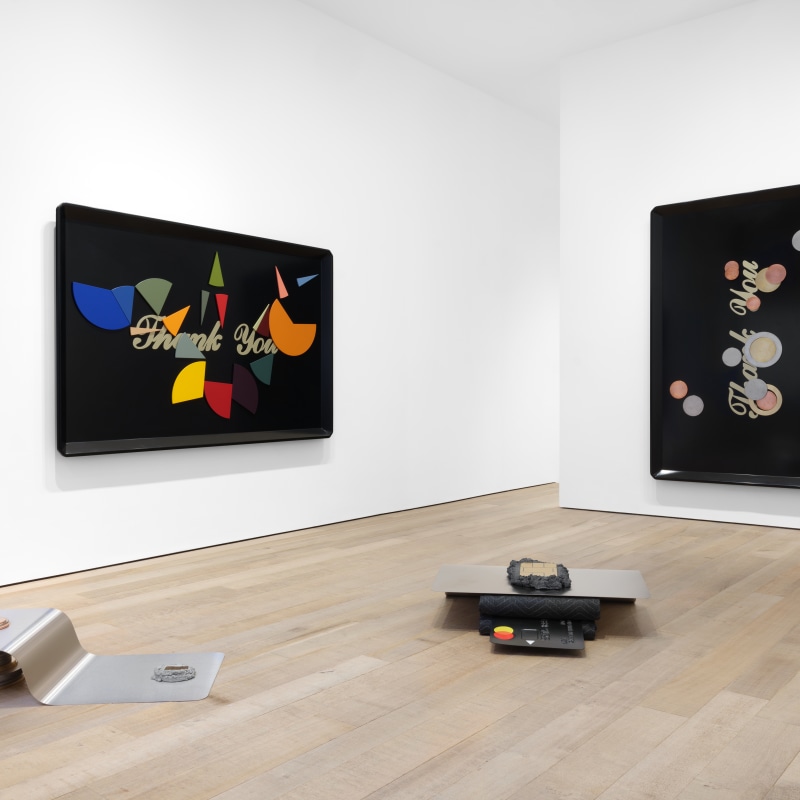Gabriel Kuri’s exhibition at Sadie Coles HQ this spring features three new bodies of work. In sculptural reliefs, textiles and assemblages of fabricated materials, Kuri explores ideas that have guided his practice in recent years – those of material and immaterial exchange, and the capacity for any given system to presage its own disintegration.
In three new sculptures in steel, Kuri has produced enlarged versions of ‘tip plates’ – the small trays used in restaurants and bars for bearing cards, receipts and cash. In place of these typical contents, Kuri has assembled sculptural objects on the surface of each plate – cut-outs from pie-graphs rendered in laser-cut steel, or curved lines based on the touchless ‘tap and pay’ logo. Referring both to physical and electronic modes of transaction, the moveable fragments imply systems that have been dismantled, dispersed, or thrown into disorder.
This sense of free play finds a counterpoint in the objects’ alluring tactility and formalism. Another tray bears an array of metal disks that resemble a Constructivist tableau. The works enact an interplay of materials and textures – soft and hard, durable and ephemeral. Occupying the boundary between two-dimensional compositions and three-dimensional reliefs, Kuri’s assemblages probe the relative values of the organic and manmade, the rarefied and throwaway. As the artist has remarked of the work of Lucio Fontana (in terms that apply equally to his own practice): “Their real locus, the place of these works was in fact the threshold, the boundary, a transitional place. His paintings were not referential windows, not abstract things, they were thresholds.”
In a new series of textile works, Kuri has imprinted lengths of silk with the designs of coins drawn from his pocket – mostly European, but with an occasional Mexican ‘interloper’. He created enlarged 3D prints of these coins and transferred the surface designs onto silk through an archaic process of rubbing. The resulting works express a combination of refinement and provisionality, accentuating the role of coins as vectors – objects that circulate wealth, information and biological traces. The vestigial designs of coins appear in variously ordered and random constellations – resembling at times the scattering of coins on a tip plate. Each coin retains its signification, while also evincing what Kuri has elsewhere called “the intuitive simplicity of a primary colour or a simple shape”. Lowly, commonplace currency is elevated and emblematized through a low-grade means of reproduction.
In three works distributed between the floor and walls, Kuri extends his long-running interest in the designs and functionality of credit cards into sculptures in stainless steel. Sheets of steel with rounded corners have been folded in various ways – turning from two-dimensional planes into three-dimensional platforms. On top of the steel supports, Kuri has mounted a variety of smaller sculptural ‘symbols’ – enlarged replicas of credit card ‘chips’ embedded in textured concrete, or an entire replica card in the same concrete bedding. Stacked metal disks have been placed above and beneath one of the steel ‘cards’. These twin forms express a dualism that runs through Kuri’s latest work – that of physical contact (as symbolised by the coins) versus abstract relations.
Gabriel Kuri (b. 1970, Mexico) studied at Escuela Nacional de Artes Plásticas U.N.A.M. México, Mexico City, and Goldsmiths College of Art, London. Kuri has exhibited internationally, with recent solo exhibitions including spending static to save gas, The Douglas Hyde Gallery, Dublin (2020); sorted, resorted, WIELS, Brussels (2019); spending static to save gas, Oakville Galleries at Centennial Square, Oakville, Canada (2018); Afterthought Is Never Binary, Sadie Coles HQ, London (2017); Product Testing Unit, Alte Fabrik, Rapperswil, Switzerland (2016); with personal thanks to their contractual thingness, Aspen Art Museum, Aspen (2014); Bergen Kunsthall, Bergen (2012); Before Contingency After the Fact, South London Gallery, London (2011); nobody needs to know the price of your saab, The Institute of Contemporary Art, Boston (2011); travelling from Blaffer Art Museum, Houston University, Houston (2010); join the dots and make a point, Kunstverein Freiburg, Freiburg (2010); and Kunstverein Bielefeld, Bielefeld (2010); and soft information in your hard facts, Museion – Museo de Arte Moderna, Bolzano (2010). Recent group exhibitions include INFORMATION (Today), Kunsthalle Basel, Basel (2021); Al filo de la navaja, Museo Jumex, Mexico City (2020); Emissaries for things abandoned by Gods, Estancia Femsa, Casa Luis Barragán, Mexico City (2019); Converter, Kunstmuseum St Gallen, St Gallen (2018); ISelf Collection: The Upset Bucket, Whitechapel Gallery, London (2017); DESERT X, Palm Springs and Coachella Valley (CA), USA; Portrait De L’artiste En Alter, FRAC – Haute-Normandie, Sotteville-lès-Rouen, France (2016); ICH, Schirn Kunsthalle Frankfurt, Frankfurt (2016); Over you / you, 31st Biennial of Graphic Arts Ljubljana, Ljubljana (2015).
